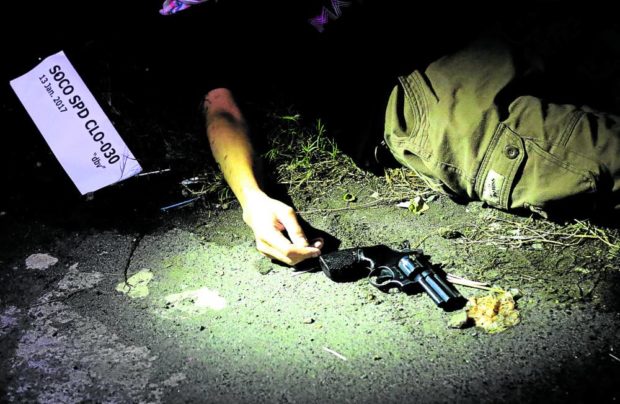
INQUIRER file photo
MANILA, Philippines — A former police officer of the Quezon City Police District (QCPD) was scolded by Antipolo 2nd District Rep. Romeo Acop.
The former law enforcer was insisting that precinct-level drug operations do not require coordination with the Philippine Drug Enforcement Agency (PDEA).
The rebuke happened at the hearing of the House committee on human rights on alleged extrajudicial killings (EJKs) in the drug war.
Acop asked former Police Major Emil Garcia if there was a need to coordinate with PDEA for the implementation of Oplan Tokhang, the past administration’s anti-drug campaign at the community level.
Garcia, in response, said at the Police Community Precinct (PCP) level, there is no need since they were just discovering drugs after inspection.
“Is that the requirement of the law? That is why the constitutionality of Oplan Double Barrel is being questioned,” Acop, a former police general, said.
“I will explain, your Honor, because at the PCP level, we do not conduct buy-bust, your Honor. There is no buy-bust at the PCP level,” Garcia replied.
“What do you call that?” Acop asked again.
“It’s just that we chanced upon the illegal drugs. ‘Onse.’ That’s just it,” Garcia answered.
Onse, or number 11 in Spanish, refers to Section 11 of Republic Act No. 9165 or the Comprehensive Dangerous Drugs Act of 2002, which refers to possession of illegal drugs.
Antipolo 2nd District Rep. Romeo Acop during one of the House hearings in this file photo taken on May 17, 2023. (Picture from a video posted on the Facebook page of the House of Representatives)
Garcia was head of the PCP that implemented a controversial anti-drug operation in Quezon City’s Barangay Payatas in August 2016.
In this crackdown, a vegetable vendor named Efren Morillo survived.
According to Morillo, it was impossible for them to fight against police officers as their hands were tied and other victims were ordered to kneel on the ground.
Acop noted that since Oplan Tokhang is part of Oplan Double Barrel, which centers on former President Rodrigo Duterte’s anti-drug program, it has to be an anti-drug operation — which Garcia eventually admitted.
“You intended to visit the people involved. Is that by chance? […],” the lawmaker wondered.
“This is an anti-drug operation, right? Because it coincides with what your subordinate said that it is in line with Oplan Tokhang. And when you do Tokhang, it’s about drugs, right?” he asked.
“I thought you’re the best in Batasan. Go, answer it. Is that drugs?” he grilled the law enforcer.
“Yes, your Honor. It was about drugs,” Garcia said.
“And, therefore, if you operate against illegal drugs, the law requires that you have to coordinate with PDEA, pursuant to Republic Act No. 9165, ‘di ba (isn’t it)?” Acop asked again.
Garcia then insisted that PDEA coordination is only needed for buy-bust operations, or those cases involving Section 5 of R.A. No. 9165, or the Sale, Trading, Administration, Dispensation, Delivery, Distribution and Transportation of Dangerous Drugs.
“If it’s a buy-bust, your Honor, if it is about a job related to ‘singko’ (Section 5), we need to do buy-bust, your Honor. But for ‘onse’ (Section 11) only, we don’t,” the police officer said.
Acop then turned to PDEA Director General Moro Virgilio Lazo, who sided with the lawmaker — that R.A. No. 9165 requires coordination with PDEA no matter what level of anti-drug operations are conducted.
“Your Honor, it doesn’t qualify. It is required that all anti-illegal drug operations should be coordinated with PDEA,” Lazo maintained.
“Yes, that is the requirement of the law, and the law did not qualify whether at any level, you had to make coordination with PDEA. That is the requirement of the law, but you did not,” he told Garcia.
READ: Ex-Batasan cop grilled over drug war’s Oplan Double Barrel
Under Section 86 of R.A. No. 9165, narcotics divisions of the PNP and the National Bureau of Investigation (NBI) will be abolished, as their duties will be conducted by the PDEA.
However, the law states that while PNP and NBI conduct investigations or operations based on R.A. No. 9165, PDEA will be the lead agency.
“Provided, however, that when the investigation being conducted by the NBI, PNP or any ad hoc anti-drug task force is found to be a violation of any of the provisions of this Act, the PDEA shall be the lead agency,” Section 86 of R.A. No. 9165 stated.
“The NBI, PNP or any of the task force shall immediately transfer the same to the PDEA,” it mandated.
“Provided, further, that the NBI, PNP and the Bureau of Customs shall maintain close coordination with the PDEA on all drug related matters,” the law also read.
Garcia then made a last-ditch attempt to explain his actions — saying that it was the practice back then, even in other PCPs that he worked with.
Acop, however, said the law must be the standard.
“But that might be a wrong practice, iho (young man)? You’re not following the correct practice,” he said.
“Even if you are assigned anywhere, even in Timbuktu, if that’s what the law says, that is what we follow.”
“Maybe that’s the reason why you police officers now are facing a lot of legal cases,” he surmised.
“Oh, in the committee on public order where I sit, there are many police officers being prosecuted because they have been implementing the law and police operational procedure or manual wrongly,” he added.
The committee on human rights has been probing EJK allegations during the past administration’s drug war.
During Wednesday’s hearing, Garcia’s subordinate was also grilled after he failed to explain how the past administration’s Oplan Double Barrel was enforced.